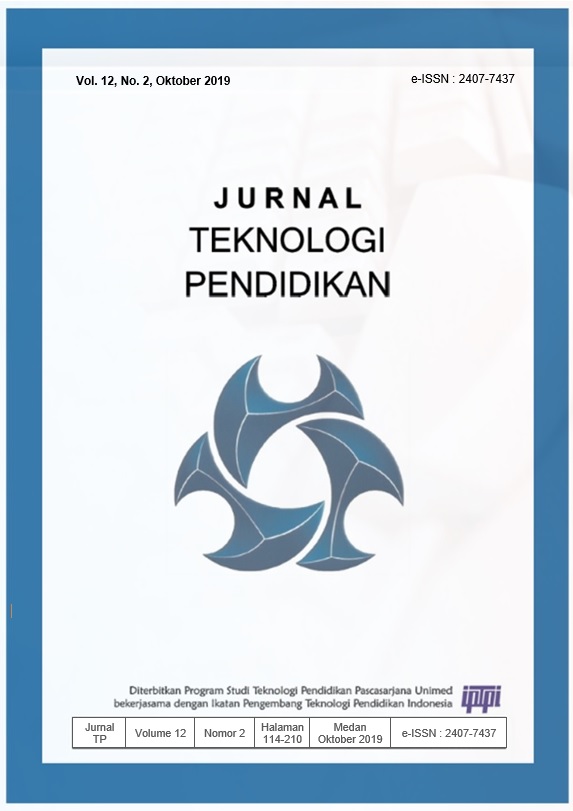PENGARUH MODEL PEMBELAJARAN KOOPERATIF DAN GAYA BELAJAR MAHASISWA TERHADAP HASIL BELAJAR PENGANTAR BISNIS
DOI:
https://doi.org/10.24114/jtp.v12i2.15229Abstract
Abstrak: Tujuan penelitian ini untuk mengetahui: (1) hasil belajar pengantar bisnis mahasiswa yang diajar dengan model pembelajaran kooperatif tipe TST lebih tinggi daripada kooperatif tipe NHT. (2) hasil belajar pengantar bisnis mahasiswa yang memiliki gaya belajar teoritis dan pragmatis. (3) interaksi antara model pembelajaran kooperatif dengan gaya belajar terhadap hasil belajar pengantar bisnis. Penelitian dilaksanakan di Universitas Methodist Indonesia. Populasi 180 orang, dengan cluster random sampling berjumlah 80 orang yang terdiri dari 40 orang kelas A dan B. Metode penelitian kuasi eksperimen, desain faktorial 2 x 2. Uji statistik dengan statistik deskriptif, dilanjutkan dengan statistik inferensial ANAVA dua jalur dengan taraf signifikan α = 0,05 dilanjutkan uji Scheffe. Sebelumnya dilakukan uji persyaratan. Hasil penelitian menunjukkan: (1) hasil belajar pengantar bisnis mahasiswa yang diajarkan dengan model pembelajaran kooperatif tipe TSTS lebih tinggi dari pada kooperatif tipe NHT; (2) hasil belajar pengantar bisnis mahasiswa yang memiliki gaya belajar teoritis lebih tinggi dari pada gaya belajar pragmatis; (3) terdapat interaksi antara model pembelajaran kooperatif dengan gaya belajar dalam mempengaruhi hasil belajar mahasiswa. Hipotesis ini menunjukkan bahwa model pembelajaran kooperatif tipe TSTS lebih tepat dari pada model pembelajaran kooperatif tipe NHT dalam meningkatkan hasil belajar pengantar bisnis mahasiswa, dan mahasiswa yang memiliki gaya belajar teoritis akan memperoleh hasil yang lebih baik dari pada mahasiswa yang memiliki gaya belajar pragmatis pembelajaran yang tepat digunakan adalah strategi pembelajaran Direct Instructional. Kata Kunci: pengantar bisnis, kooperatif tipe TST, NHT, gaya belajar Abstract: The purpose of this study is to find out: (1) the results of introductory business learning of students taught with the cooperative learning model of the TST type are higher than that of the NHT cooperative type. (2) introductory student learning outcomes that have theoretical and pragmatic learning styles. (3) the interaction between cooperative learning models and learning styles on introductory business learning outcomes. The research was conducted at Methodist University in Indonesia. A population of 180 people, with a cluster random sampling of 80 people consisting of 40 people class A and B. Quasi-experimental research methods, factorial design 2 x 2. Statistical tests with descriptive statistics, followed by inferential statistics two-way ANOVA with a significant level α = 0.05 continued with the Scheffe test. Previously performed requirements testing. The results showed: (1) the results of introductory business learning of students taught with the cooperative learning model of the TSTS type were higher than that of the NHT type of cooperative; (2) the introductory learning outcomes of business students who have higher theoretical learning styles than pragmatic learning styles; (3) there is an interaction between cooperative learning models and learning styles in influencing student learning outcomes. This hypothesis shows that the TSTS type of cooperative learning model is more appropriate than the NHT type of cooperative learning model in improving student business introductory learning outcomes, and students who have a theoretical learning style will get better results than students who have appropriate pragmatic learning styles of learning used is the Direct Instructional learning strategy. Keywords: business introduction, cooperative TST type, NHT, learning styleReferences
Agustian, A.G. (2004). ESQ POWER. Jakarta : Penerbit Arga.
Anderson, W.L., dkk, (2001), A Taxanomy or Learning, Teaching, and Assessing: A Revision of Bloom™s Taxanomy Objectives, New York: Longman Inc.
Arends, Richard I. (2008). Learning To Teach. Jakarta. Pustaka Belajar
Asri, Budiningsih. (2005). Belajar dan Pembelajara. Jakarta. Bumi Aksara
Ausubel , D.P,. (1963), The Psycholoy of meaningful verbal Learning, New York: Grune & Stratton Publishers.
Bruner, J. (1996). The Cultural Of Education. London : Harvard Univercity press.
Coffield, F., et al. (2004). Learning Style and Pedagogy in post-16 Learning A Systematic and Critical Review. London: Cromwell Press Ltd.
Corebima. (2009). Berdayakan Keterampilan Berpikir Selama Pembelajaran SAINS Demi Masa Depan Kita. Surabaya: UNESA University Press.
DePorter, B. (2004). Quantum Learning, Bandung: Kaifa.
DePorter, B., Reardon, M., dan Sarah, S. (2004). Quantum Teaching, Bandung: Kaifa.
Griffin dan Ronald J.Ebert, (1996). Bisnis, Buku Satu, Edisi ke-4, Jakarta
Gunter, M., et al. (1990). Instruction: A Models Approach. Boston: MA: Allyn & Bacon.
Ibrahim, M. dkk.(2000). Pembelajaran Kooperatif. Surabaya: University Press.
Isjoni. (2010). Pembelajaran Kooperatif Meningkatkan Kecerdasan Komunikasi Antar Peserta Didik. Yogyakarta: Pustaka Pelajar.
Joyce Bruce and Weil Marsha, (1986). Models Of Teaching. New Delhi. Prentice Hall.
Kagan, S. (1992). Cooperative Learning (Model pembelajaran kooperatif two stay two stray), Yogjakarta :pustaka insani madani.
Karuru, Predy, (2006), Penerapan Pendekatan Keterampilan Proses dalam Setting Pembelajaran Kooperatif Tipe STAD untuk Meningkatkan Kualitas Pembelajaran IPA Siswa SLTP.
Kolb, D, A. (1984). Experiential Learning Experience as The Source of Learning and Development. New Jersey: Prentice Hall.
Lie, Anita. (2008). Cooperative Learning. Jakarta. Grasindo
Mbulu, J. (2001). Pengajaran Individual. Malang: Yayasan Elang Mas.
Merril M. David, Twitcell, David G. (1991). Instructional Design Theory. Englewood Cli ffs. New Jersey: Educational Technology Publication
Nasution, S. (2006). Kurikulum dan Pengajaran. Jakarta: Bumi Aksara.
Nunan, D., (1991), Language Teaching Methodology: A Textbook for Teachers, Cambridge: Cambridge University Press
Panjaitan, B. (2006). Karateristik Pebelajar Dan Konstirbusinya Terhadap Hasil Belajar. Medan : Penerbit Poda.
Prashnig, B. (2007). The Power of Learning. Bandung: Mizan Pustaka.
Purwanto, N. (2007). Psikologi Pendidikan Remaja. Bandung: Rosdakarya
Ratumanan, T. G. (2002). Belajar dan Pembelajaran. Surabaya: Unesa.
Reigeluth, C.M. (1983). Instructional Design Theory And Models. An Overview of Their Current Status. London: Prentice Hall
Romizwoski, A.J. (1981). Instructional Design System, Decision Making in Course Planning and Curriculum Design. London: Kogan
Slavin, Robert E. (1995). Cooperative Learning: Teory, Research and Praktice (2 ed). Boston: Allyn and Bacon Piblicher
Downloads
Published
How to Cite
Issue
Section
License

Jurnal Teknologi Pendidikan (JTP) is licensed under a Lisensi Creative Commons Atribusi 4.0 Internasional.




